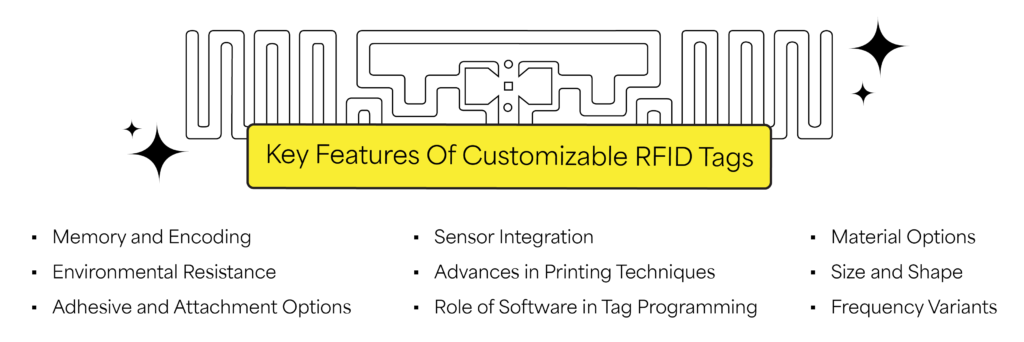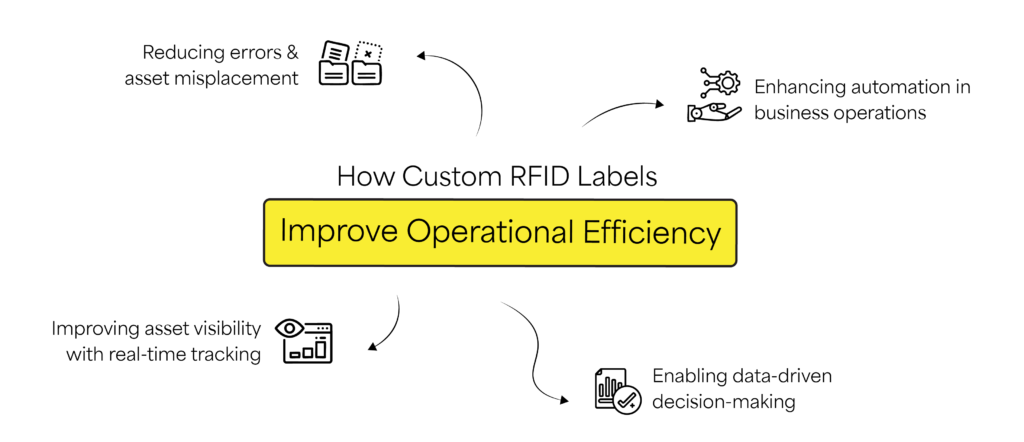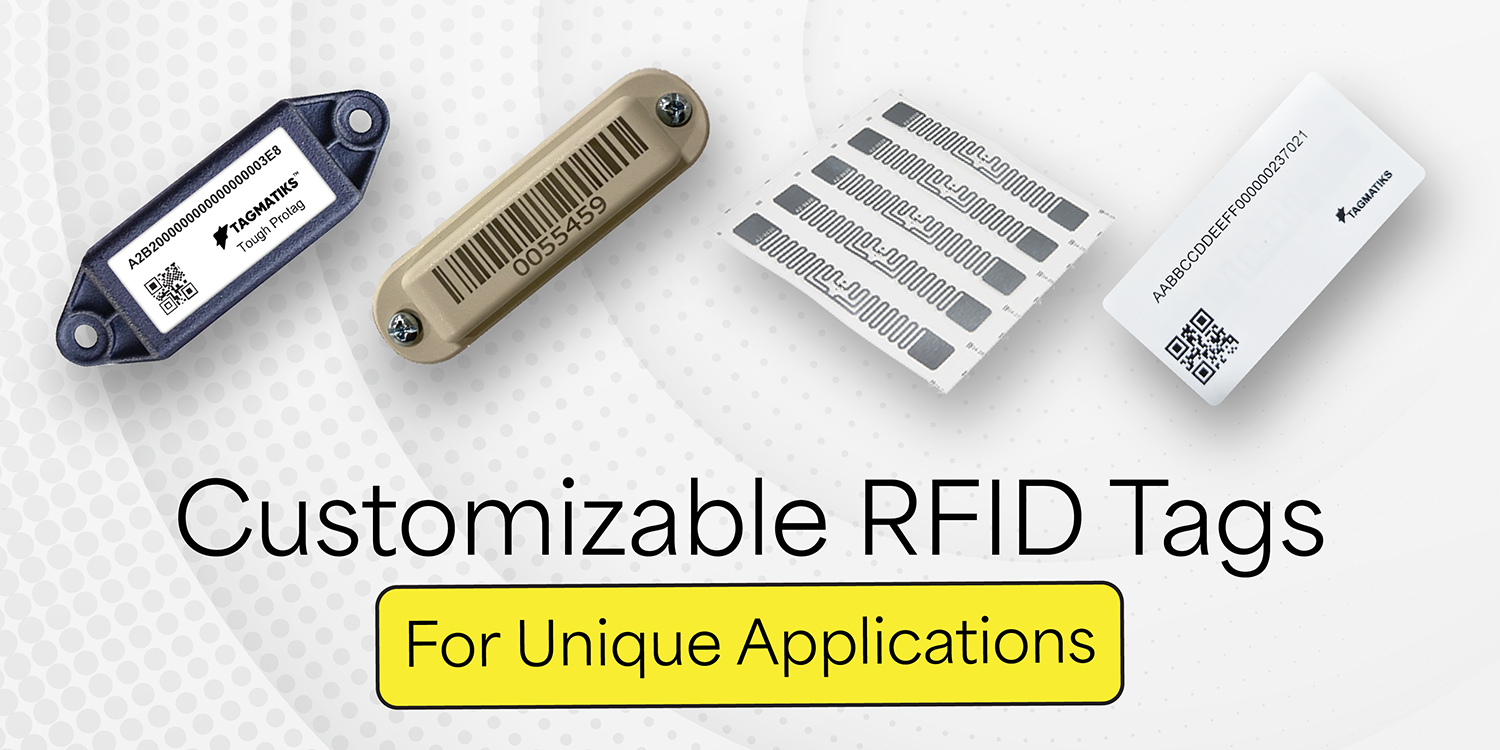Introduction
RFID technology has transformed the way businesses track and manage assets, providing a seamless and automated solution for inventory control, asset tracking, and supply chain management. Traditional RFID tags are effective, but many industries require specialized solutions to meet unique operational challenges.
Customizable RFID tags offer tailored options in terms of material, size, frequency, encoding, and data storage, making them ideal for industries with specific tracking needs. This blog explores customizable RFID tags, their features, applications, and how they enhance operational efficiency.
What Are Customizable RFID Tags?
Customizable RFID tags are RFID-enabled labels or devices that can be modified to suit specific applications. Unlike standard RFID tags, which come in predefined shapes, sizes, and frequencies, customizable RFID tags allow businesses to tailor their features based on operational needs.
Key Features of Customizable RFID Tags

Material Options
Custom RFID tags can be made from materials such as paper, plastic, fabric, and metal-compatible substrates. The choice of material depends on environmental conditions and application requirements.
Size and Shape
RFID tags come in various form factors, including small adhesive labels, ruggedized tags, wristbands, and embedded chips for discreet tracking.
Frequency Variants
Different industries require different RFID frequencies:
- LF (125 kHz – 134 kHz): Ideal for short-range tracking such as livestock identification.
- HF (13.56 MHz): Used in access control, contactless payments, and smart cards.
- UHF (860-960 MHz): Suitable for inventory management and logistics.
Memory and Encoding
Custom RFID tags support variable memory capacities, allowing businesses to store relevant data such as product details, serial numbers, and expiration dates.
Environmental Resistance
Custom RFID tags can be designed to withstand harsh conditions, including:
- Waterproof and moisture-resistant tags for outdoor applications.
- Heat-resistant tags for industrial and manufacturing environments.
- Chemical-resistant tags for pharmaceutical and hazardous material tracking.
Adhesive and Attachment Options
RFID tags can be affixed using stickers, embedded into products, sewn into fabric, or mounted using screws for long-term durability.
Sensor Integration
Advanced RFID tags can include sensors for temperature, humidity, and motion detection, making them valuable for supply chain monitoring and quality control.
Advances in Printing Techniques
Innovations such as 3D printing and flexible electronics enable the creation of ultra-thin, highly customizable RFID tags for various applications.
Role of Software in Tag Programming
Software solutions like TagMatiks RFID Software allow businesses to configure, encode, and manage RFID tag data efficiently, ensuring seamless integration with existing tracking systems.
Unique Applications of Customizable RFID Tags
Custom RFID Labels for Healthcare & Pharmaceuticals
Custom RFID tags help track patient movements, authenticate medications, and monitor the sterilization status of surgical instruments, improving safety and compliance. RFID in Healthcare solutions enhance patient care by ensuring accurate data capture and reducing medication errors.
Custom RFID Tags for Retail & Apparel
Retailers use branded RFID tags for inventory tracking, anti-theft solutions, and personalized shopping experiences, reducing losses and enhancing customer engagement. RFID for Retailers helps optimize stock management and improve customer satisfaction through real-time data insights.
Custom RFID Labels for Automotive & Manufacturing
Manufacturers rely on RFID tags for part authentication, real-time assembly line tracking, and tool inventory management, ensuring efficient production processes. RFID in Manufacturing increases efficiency and minimizes downtime by automating workflows and asset monitoring.
Logistics & Supply Chain
Tailored RFID tags enable real-time tracking of shipments, warehouse inventory, and pallets, optimizing logistics and reducing misplacement of assets. RFID for Supply Chain management enhances traceability and improves operational efficiency by providing end-to-end visibility.
Hospitality & Events
Personalized RFID wristbands provide seamless access control, cashless payments, and attendee tracking at events, hotels, and entertainment venues.
Custom RFID Labels for Oil & Gas, Mining & Construction
Ruggedized RFID tags are designed for extreme environments, allowing for equipment tracking, safety monitoring, and compliance with industry regulations. RFID for Oil & Gas industry ensures asset durability and enhances safety by monitoring high-value equipment in hazardous conditions.
How Custom RFID Labels Improve Operational Efficiency

Enhancing automation in business operations
Custom RFID labels reduce the need for manual scanning, minimize human errors, and streamline workflows, allowing businesses to focus on efficiency and productivity.
Improving asset visibility with real-time tracking
RFID technology ensures businesses can monitor their assets in real-time, providing accurate status updates and reducing the chances of misplaced or lost items.
Reducing errors and asset misplacement
Custom RFID tags help prevent inventory miscounts, misplaced assets, and theft, ensuring better asset management and reducing financial losses.
Enabling data-driven decision-making
By capturing valuable analytics, RFID tags offer insights into operational trends, helping businesses optimize inventory management, improve supply chain efficiency, and enhance overall performance.
Challenges of Customizable RFID Tags
Higher initial design and production costs: Custom RFID tags require specialized materials, unique encoding, and tailored manufacturing processes, leading to higher upfront costs compared to standard RFID tags. However, the long-term benefits often outweigh the initial investment.
Compatibility with existing RFID readers and systems: Businesses must ensure that custom RFID tags work seamlessly with their current RFID infrastructure. Compatibility issues can lead to additional integration efforts, requiring firmware updates or specialized readers for effective implementation.
Balancing customization with scalability for mass deployment: While customization enhances functionality, businesses must find a balance between tailored RFID solutions and large-scale deployment to ensure cost efficiency and operational feasibility without compromising performance.
Considerations When Choosing Custom RFID Tags
Application-Specific Needs: Define the purpose of the RFID tag.
Environmental Conditions: Consider exposure to heat, moisture, or chemicals.
Read Range Requirements: Ensure compatibility with existing RFID readers.
Regulatory Compliance: Align with industry standards and regulations.
Cost-Effectiveness: Balance performance with budget constraints.
Conclusion
Custom RFID solutions provide businesses with the flexibility to design RFID tags tailored to their specific operational requirements. Whether in healthcare, retail, logistics, or industrial applications, customizable RFID tags enhance efficiency, security, and real-time tracking capabilities. Investing in a tailored RFID solution can help businesses streamline operations, reduce losses, and gain better control over their assets.
